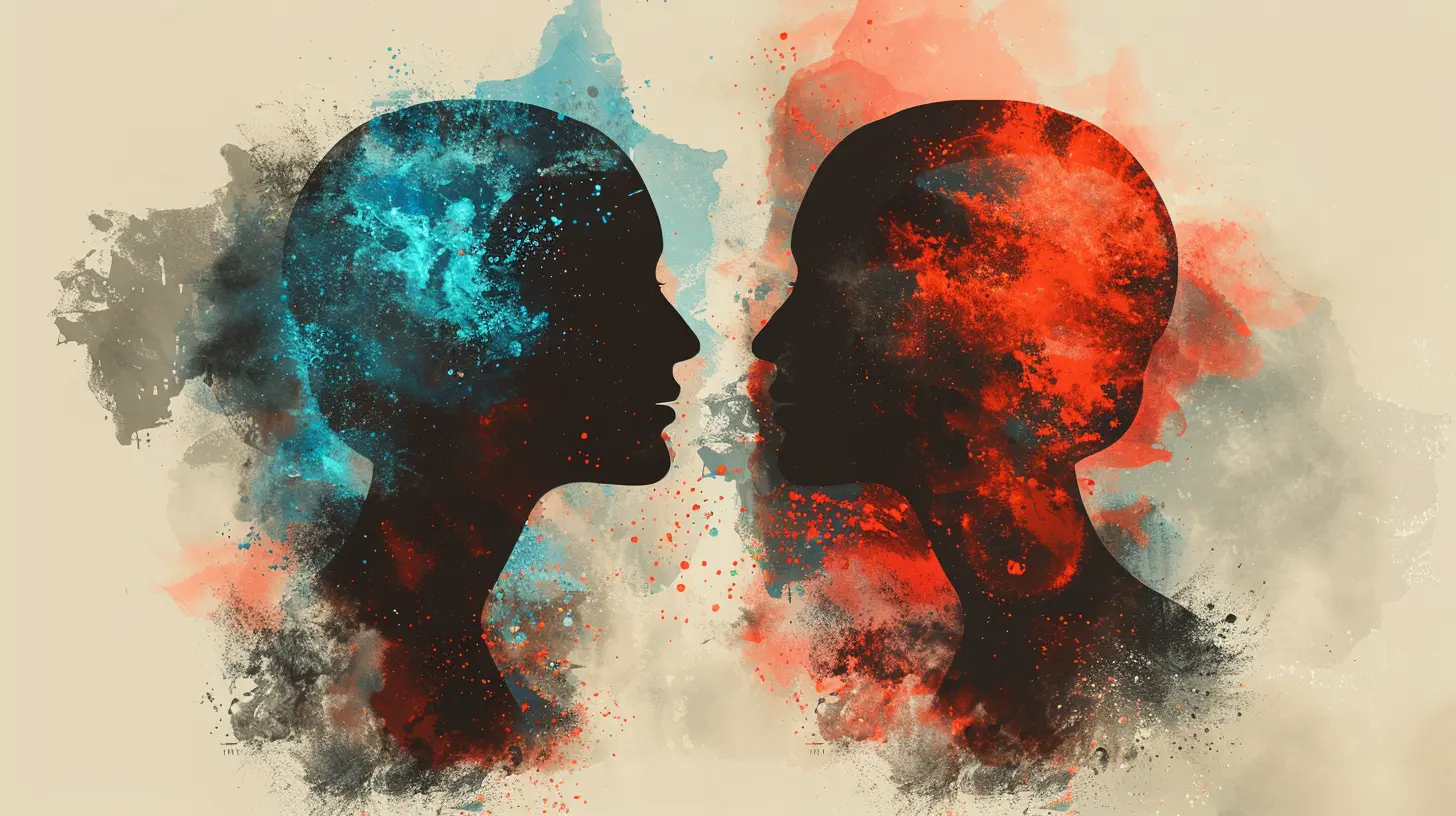The Intersection of Chronic Illness and Mental Health: Coping with Dual Diagnoses
3 December 2024
Living with a chronic illness isn’t just about managing physical symptoms. It can feel like running a marathon every day with no finish line in sight. But what happens when we add a mental health disorder on top of the already heavy load? It’s not just a matter of dealing with one condition, but two – and sometimes more. The intersection of chronic illness and mental health can create a storm of emotions, challenges, and frustrations.
In this article, we're going to dive into what it means to have both a chronic illness and a mental health condition, how they interact, and practical tips for coping with a dual diagnosis that threatens to overwhelm not just your body, but your mind as well.

What is a Dual Diagnosis?
Let’s start at the beginning. A dual diagnosis refers to the presence of two or more simultaneous conditions in an individual. It can mean a variety of things, but in this case, we’re talking about a chronic illness (like diabetes, heart disease, or multiple sclerosis) and a mental health disorder (like depression or anxiety) happening together.So, imagine you’re already managing a physical illness — you’re seeing doctors, adjusting your lifestyle, and taking medication to cope with that illness. Then, on top of that, you notice signs of a mental health condition sneaking in. Maybe you’ve started to feel more down than usual, or have constant feelings of anxiety. This is the duality that many people face: body and mind both struggling, but often in different ways.
The Connection Between Physical Health and Mental Health
It’s easy to forget that the mind and body are deeply connected. In fact, both influence each other so strongly that an issue in one often creates symptoms in the other. Chronic illness and mental health disorders don’t exist in isolation. They interact, sometimes in surprising ways. Here’s a closer look at the connection:- Chronic illness can trigger mental health issues. When you’re dealing with a long-term physical condition, it can be exhausting. The constant pain or discomfort, endless doctor’s visits, or limitations on what you can do can lead to feelings of isolation, sadness, and helplessness. Over time, this can evolve into depression, anxiety, or even conditions like PTSD.
- Mental health issues can worsen physical symptoms. On the flip side, when you’re already dealing with depression or anxiety, it can compound the symptoms of your physical illness. For example, depression often depletes your energy, making it harder to take care of yourself, stick to treatment plans, or even get out of bed. Anxiety can exacerbate pain and other physical symptoms, creating a vicious cycle where both conditions get worse.
The Vicious Cycle of Dual Diagnoses
Here’s the kicker: when you’re fighting battles on two fronts — your body and your mind — it’s easy to feel like everything is spiraling out of control. Chronic illness can lead to mental health struggles. Mental health struggles can worsen the symptoms of your physical illness. And around and around we go.This vicious cycle can leave you feeling trapped in a never-ending loop of suffering and stress. It’s like trying to juggle while riding a bicycle, with both wheels constantly wobbling out from under you. It’s exhausting and demoralizing. But, take a deep breath — this cycle can be broken.

Common Mental Health Disorders Seen With Chronic Illness
While anyone with a chronic illness can face mental health challenges, some mental health disorders are more common than others in individuals with long-term physical health conditions. Let’s explore a few of the most prevalent.1. Depression
Depression often comes hand-in-hand with chronic illness. It’s not just about feeling sad — depression can sap your energy, make it difficult to concentrate, destroy your motivation, and even contribute to physical symptoms like headaches or digestive issues. When you’re already battling a long-term illness, piling depression on top of that can make even simple tasks feel Herculean.What’s worse? Depression can make it harder to manage your chronic illness. Maintaining a healthy diet, following medication routines, and keeping up with doctor’s visits can seem impossible when you’re deep in a depressive episode.
2. Anxiety
Anxiety is like a constant background noise that you can’t shut off. It’s no surprise that dealing with a chronic illness can create anxiety — the uncertainty, the constant medical monitoring, the fear of flare-ups, and the changes in your body all contribute to intense worrying.Over time, this anxiety can morph into a full-blown generalized anxiety disorder, where worries about your health start to overshadow the rest of your life. Even simple things, like leaving the house or meeting friends, can trigger feelings of fear and panic.
3. Post-Traumatic Stress Disorder (PTSD)
PTSD is often associated with a major traumatic event, but did you know that living with a chronic illness can also lead to PTSD? The ongoing trauma of facing medical emergencies, surgeries, or even near-death experiences may leave you in a constant state of hypervigilance. You’re on edge, waiting for the next “bad thing” to happen. The body’s physical state can trigger flashbacks, nightmares, and intense emotional reactions.4. Cognitive Impairment ("Brain Fog")
While not a diagnosable mental health condition, many people with chronic illnesses experience “brain fog”— a kind of cognitive impairment that clouds your thoughts, makes decision-making tough, and leaves you feeling mentally sluggish. Although not the same as anxiety or depression, brain fog can worsen mental health by making it harder to think clearly and manage daily tasks. It can be another layer of frustration when you’re already dealing with emotional and physical exhaustion.
Coping Mechanisms For Dual Diagnoses
When you’re managing both a chronic illness and a mental health condition, coping is key. And while that might sound daunting, there are ways to navigate this challenging road. Think of coping mechanisms as your toolkit — filled with strategies to help you regain control, even when it feels like everything is falling apart.1. Seek Professional Support
Perhaps the most obvious — yet most crucial step — is to seek professional help. You wouldn’t manage a chronic illness alone, and you shouldn’t manage mental health issues alone either. Therapists, counselors, and psychiatrists who specialize in chronic illness can help you develop coping strategies and provide support.Your mental health care should work in tandem with your physical health care. This might mean working with a team of professionals who communicate with each other, ensuring both your body and mind are on the same page.
2. Self-Compassion and Acceptance
This is one of the hardest aspects of living with a chronic illness and mental health disorder. It’s easy to get caught up in guilt, shame, or frustration with your body and mind. You may feel like you’ve lost the person you once were — the one who didn’t have to think about health every second of the day.But here's the thing: self-compassion can go a long way. Try to treat yourself the way you would treat a friend who is going through a hard time. Instead of beating yourself up for not being able to do everything, allow yourself some grace. Your body is doing the best it can.
3. Routine and Structure
Chronic illness and mental health conditions can thrive in chaos. One way to combat this is by establishing a daily routine. It doesn’t have to be rigid, but having some regularity in your day (even in small things like waking up at the same time or planning meals) can provide a sense of stability when everything else feels unpredictable.4. Mindfulness and Relaxation Techniques
The connection between mind and body means that our mental state has a direct effect on how we experience physical symptoms (and vice versa). Practicing mindfulness — paying close attention to the present moment without judgment — can help you cope with the mental strain that chronic illness brings.Breathing exercises, meditation, and progressive muscle relaxation can calm anxiety and reduce the intensity of physical symptoms like pain or fatigue. These techniques give you a sense of control, even when your health feels out of your hands.
5. Join a Community
Living with both chronic illness and mental health problems can feel isolating. You might feel like no one understands what you’re going through. Joining a support group (either in person or online) can provide a sense of community. You’ll meet others who “get it,” share coping strategies, and provide mutual support during tough times.
The Importance of Holistic Care
When you're managing a dual diagnosis, it isn’t just about treating one thing at a time. You need holistic care — that means addressing the emotional, physical, and even social aspects of your well-being. It’s not just about taking medication for your physical condition but acknowledging that your emotional health plays a role too.Holistic care might involve a combination of therapies — physical treatment plans, mental health counseling, lifestyle changes, and spiritual or emotional support. The goal is to treat you as a whole person – not just as a collection of symptoms.
Conclusion
Dealing with the intersection of chronic illness and mental health can feel overwhelming — as if you’re trapped in a relentless maze with no way out. But with the right support, coping mechanisms, and compassion for yourself, it’s possible to create a life where both your body and mind are taken care of. Remember, you’re not alone in this, and reaching out for help is a sign of strength, not weakness.Navigating dual diagnoses is hard work, but you are more resilient than you know.
all images in this post were generated using AI tools
Category:
PsychopathologyAuthor:

Christine Carter
Discussion
rate this article
15 comments
Roxie Rogers
Feeling like a circus performer: balancing chronic illness and mental health!
February 2, 2025 at 4:21 PM

Christine Carter
Thank you for your insight! It truly is a delicate balancing act, and recognizing that struggle is an important step towards finding support and strategies.
Gunnar McKale
Navigating the complexities of chronic illness and mental health can be challenging, but remember: you are not alone. Embrace each small victory and seek support. Your journey is valid, and each step forward is a testament to your strength.
January 29, 2025 at 5:20 PM

Christine Carter
Thank you for your kind words! It's crucial to highlight the importance of support and celebrating small victories in this journey. Together, we can foster understanding and resilience.
Oliver McMillan
This article sparks my curiosity! How do chronic illnesses uniquely influence mental health, and what strategies are most effective for managing these intertwined challenges?
January 24, 2025 at 5:20 AM

Christine Carter
Chronic illnesses can lead to increased stress, anxiety, and depression due to their physical limitations and ongoing nature. Effective strategies for managing these challenges include integrated care approaches, cognitive-behavioral therapy, mindfulness practices, and building a strong support network.
Rosalie Stone
Thank you for shedding light on such an important topic. Navigating chronic illness alongside mental health challenges can be incredibly tough. Your insights offer hope and understanding for those facing dual diagnoses.
January 16, 2025 at 5:03 AM

Christine Carter
Thank you for your kind words! I'm glad the article resonated with you and hope it brings support to those navigating these challenges.
Gunner McDonough
Thank you for addressing the important connection between chronic illness and mental health. Your insights highlight the complexities faced by individuals managing dual diagnoses. It's crucial to foster understanding and support for those navigating these challenges. I appreciate the thoughtful discussion on this often-overlooked topic.
January 14, 2025 at 3:59 AM

Christine Carter
Thank you for your thoughtful response! I’m glad you found the discussion valuable and important. Your support for raising awareness on this topic is greatly appreciated.
Gianna McQuade
Double the diagnoses, double the sass! Let’s tackle chronic illness and mental health like the fierce warriors we are!
January 12, 2025 at 4:19 AM

Christine Carter
Absolutely! Embracing our strength is key to navigating the complexities of dual diagnoses. Together, we can empower each other through this journey!
Brick Good
This article poignantly highlights the often-overlooked interplay between chronic illness and mental health. By addressing dual diagnoses, it underscores the necessity for an integrated approach to treatment, emphasizing that holistic care can significantly enhance the quality of life for those affected.
January 8, 2025 at 5:33 PM

Christine Carter
Thank you for your insightful comment! I'm glad you found the article’s focus on integrated treatment for chronic illness and mental health to be impactful. Holistic care is indeed vital for improving quality of life.
Elena McQuillen
What a thought-provoking read! The connection between chronic illness and mental health is so vital yet often overlooked. It’s encouraging to see discussions on dual diagnoses gaining attention. Strategies for coping are essential for holistic well-being. Thank you for shedding light on this important intersection!
January 4, 2025 at 4:10 AM

Christine Carter
Thank you for your thoughtful comment! I’m glad you found the article meaningful—raising awareness about this intersection is crucial for supporting holistic well-being.
Lyanna Barker
Navigating the complexities of chronic illness and mental health can feel overwhelming, but remember, you’re not alone on this journey! Embrace small victories and be gentle with yourself. Each step you take toward understanding and coping is a testament to your resilience. Keep shining, you’ve got this!
December 29, 2024 at 4:08 AM

Christine Carter
Thank you for your encouraging words! It’s vital to acknowledge the journey and celebrate those small victories. Together, we can find strength in our shared experiences.
Zorion Lynch
Embracing resilience in the face of dual diagnoses can illuminate paths to healing and empower personal growth. You're not alone!
December 24, 2024 at 5:00 PM

Christine Carter
Thank you for your insightful comment! Embracing resilience is indeed key to navigating the challenges of dual diagnoses. Together, we can foster understanding and support.
Halle Wolf
Empowerment through understanding and resilience!
December 21, 2024 at 5:52 AM

Christine Carter
Thank you! Empowerment is indeed key in navigating the challenges of chronic illness and mental health. Understanding and resilience play crucial roles in this journey.
Yvette Johnson
This article insightfully highlights the complexities of managing chronic illness and mental health. Understanding their intersection is crucial for effective coping strategies and holistic care.
December 11, 2024 at 4:10 PM

Christine Carter
Thank you for your thoughtful comment! I’m glad you found the article insightful; understanding this intersection is indeed vital for better care and coping strategies.
Kestrel Newman
In the shadows where chronic illness and mental health intertwine, lies a realm of untold stories. Each diagnosis whispers secrets of resilience and vulnerability. What happens when the body and mind clash? The answers may reveal more than we dare to explore.
December 5, 2024 at 6:01 AM

Christine Carter
Thank you for highlighting the complex relationship between chronic illness and mental health. It’s crucial to explore these untold stories, as they can provide valuable insights into resilience and coping strategies.
Noemi Matthews
This insightful article highlights the complex relationship between chronic illness and mental health. It emphasizes the importance of integrated care, acknowledging that understanding both aspects can significantly improve patient outcomes and enhance coping strategies.
December 4, 2024 at 4:49 PM

Christine Carter
Thank you for your insights! I’m glad you found the article highlights the importance of integrated care in addressing both chronic illness and mental health. Your feedback is much appreciated!
Reid McElroy
This article highlights the complex relationship between chronic illness and mental health. Understanding how these dual diagnoses interact is essential for developing effective coping strategies and providing comprehensive care for affected individuals. Insightful and necessary discussion.
December 3, 2024 at 4:37 PM

Christine Carter
Thank you for your thoughtful comment! I'm glad you found the discussion on this important intersection insightful. Understanding the interplay between chronic illness and mental health is indeed crucial for effective care.
MORE POSTS

Finding Inner Peace with Mindfulness Meditation

The Psychology of Resilience: Why Some People Bounce Back Stronger

Cognitive Dissonance in the Workplace: How It Impacts Productivity

The Role of Forensic Psychology in Human Trafficking Cases

Night Owls vs. Early Birds: How Sleep Chronotypes Affect Mental Health

How to Heal from a Toxic Relationship: A Psychological Perspective

The Role of Family Therapy in Treating Mood Disorders

Cognitive Dissonance and Climate Change: Why People Resist Environmental Action

The Role of Mindfulness in Healing Trauma

Complicated Grief: When Loss Leads to a Mental Health Crisis